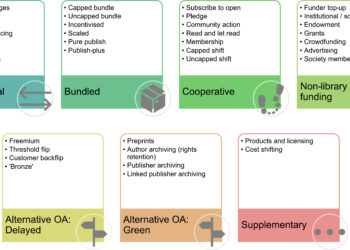 Maybe it’s a form of the Baader-Meinhof phenomenon that, having started a business myself, it suddenly seems to me that everyone’s doing it. Or maybe everyone actually is doing it. After all, the commoditization of technology, and the advent of the web, have made it substantially easier to set up, run and market a new business. But beyond such technological change, has there also been cultural change? In recent conversations with some of my entrepreneur friends I’ve been musing on what they believe drives their success, and whether they have any characteristics in common. Their companies span a range of sectors, but their insights can I think be valuable to those of us within the scholarly information community, so I thought I’d share some tidbits here.
Maybe it’s a form of the Baader-Meinhof phenomenon that, having started a business myself, it suddenly seems to me that everyone’s doing it. Or maybe everyone actually is doing it. After all, the commoditization of technology, and the advent of the web, have made it substantially easier to set up, run and market a new business. But beyond such technological change, has there also been cultural change? In recent conversations with some of my entrepreneur friends I’ve been musing on what they believe drives their success, and whether they have any characteristics in common. Their companies span a range of sectors, but their insights can I think be valuable to those of us within the scholarly information community, so I thought I’d share some tidbits here.
- Sarah Giblin founded Riut, and designed the company’s first product, the award-winning Riutbag (a rucksack where the zips are all against your back for “safe, calm city travel”).
- Tom Harwood is co-founder and CPO of Aeriandi, which provides telephone software and systems with a focus on phone-based credit card transactions.
- Will Jones is the founder and Managing Director of Wordery, one of the top three online independent bookshops.
What motivates people to start their own businesses?
“The ability and the opportunity to create something, without constraint,” says Will. This theme is common among the entrepreneurs I have met – they congregate in the self-actualization pinnacle of Maslow’s hierarchy. For Sarah, “I felt that my skills, powers and superpowers were not being used to their greatest extent. I had a strong feeling that I want to look back when I’m 40 and be really thrilled with the last 10 years of my life. Doing this is the best use of me in the universe right now.” Many entrepreneurs are also motivated, at least in the beginning, by wanting to have more complete control over and confidence in the output, processes, people and culture of their organization. Sarah continues, “By running my own company I get to make real things happen at my own pace. I try new ideas on my time, with my money and keep things simple. Making a product I know is beneficial to people is a great feeling. There’s no pretense. It has no false health claims, sales tactics or add-ons. It’s a simple product that I know brings people peace of mind.”
What kind of person makes a successful entrepreneur?
“Optimism is an incredibly important factor,” says Tom, “perhaps to the point of slight madness. Hard graft [in the UK sense of “work” rather than “bribery”!], an understanding of where you are weak, and the general ability to network.”
“I don’t think it takes a certain type,” says Sarah. “Anyone who has ever complained about anything can be a successful entrepreneur; if you’ve got a complaint, you’ve spotted a problem that needs solving.” She flags up the importance of understanding your use case (“I travel alone a lot and I felt the conventional rucksack was a useful but flawed companion. It left me worrying about whether my belongings were still all there.”) and demonstrates the vision, determination and can-do attitude that we expect of innovators (“I wanted a rucksack with no outer zips; when I couldn’t get one anywhere, I went and made one.”)
How important is the “right” climate?
The digital revolution may have facilitated entrepreneurship but it’s also made it harder. “The bar is lower,” says Will. “It’s easier to try to start a business, but harder to succeed in doing so.” At the time he started Wordery, “you would have looked at online book selling and thought I was mad to go into such a market” – but there were gaps there to be exploited. Wordery’s long-tail strategy competes effectively with the big retailers not for bestseller business, but in the much less price-sensitive market of over 9 million back list titles. There are gaps in any environment, in any climate, and as Sarah points outs, “If you’ve worked in large corporations or even medium sized companies as an employee, you might think that confirming the gap in the market is something that happens through £30k market research reports. It needn’t always work that way.” For Tom, success has been about “seizing opportunity and pivoting quickly as these opportunities have arisen.”
How can people fund innovation?
There is no end to the ways that ambitious people fund new businesses. Sarah “lived frugally for a few years” to save enough to get her started, and then used Kickstarter. It’s notable that she turned down an invitation to present her idea in the Dragon’s Den (known as Shark Tank in the US) “because I wanted to keep things simple.” Tom and his colleagues, meanwhile, used what was left of their combined university overdrafts to get set up, and then funded the ongoing development of the business by selling professional services alongside their software. He notes, however, that “I’d never do this again. I’d find a good idea, build a strong business case, do some prep work, and then get it funded (in a way, that would prove the idea in the first place, or prove it wrong, which is just as valuable).” Wordery’s joint venture with Bertrams “meant that we could accelerate quickly,” says Will. “We didn’t have to spend a lot of time building the back end; we could focus on the front end” and claim the space before a competitor stepped up (see “Be focused”, below).
Top tips:
- Be focused
On the other hand, Will continues: “Outsource anything that’s vanilla; your time is the most valuable thing – particularly early on – so spend it doing the things that make the difference. Don’t consume your time with routine.” You also need to be careful in choosing the scope and direction of the business. “Opportunities are all around you at all times,” says Tom. “Like learning a new word and then reading it all over the place [Baader-Meinhof again!], the moment you get yourself into a position to take advantage of an opportunity, one will invariably present itself. In the last 12 months, we’ve dropped about 80% of our portfolio to concentrate on the 20% we can see most value and opportunity in. We had fallen into the trap of trying to do too much for too many people and so weren’t realizing the economies of scale achievable by creating something once and selling it many times.” - Just say no (do it yourself)
Given how quickly you will want to make progress, often on several fronts, it’s easy to seek additional capacity from experts in your network. “I’m often approached with offers of services and consultancy to help accelerate the business,” says Will. “I’ve learned to say no to all of them. Anything that’s offered to us will have been offered to others. If it’s something that’s going to revolutionize what we do, if it’s going to differentiate us, we need to do it ourselves – if someone else can do it, anyone can do it.” - Be humble
Recognize that there will be gaps in your knowledge, and be active in filling them. Tom’s most unexpected challenge was “realizing what we didn’t know, or didn’t know we didn’t know. Were I to start a new company now, I’d concentrate more on areas like market analysis, product management and sales from the outset. Looking back, we were far more concerned with the technology without truly understanding what we weren’t doing. It took a long time and some growing up to realize all this. Recently, we’ve appointed a strategic board function that’s been a real eye-opener; people who have been there and done it and can see with some perspective on what we need to do now.” Sarah uses surveys to gather feedback from customers – “Data is a fantastic thing. It’s up to you what you do with it; but let it surprise you and take you in new directions.” she says in this related blog (where she also, serendipitously given my previous Kitchen posting, shares some excellent tips for content marketing.) - Be passionate
You need to be “single-minded”, says Will, avoiding distractions, and committing “most of your life” to building your business. “I get out what I put in,” concludes Sarah. “The more I do to create this company, and make sure I have a life worth living at the same time, the more it gives to me. It’s an amazing feedback loop if you have the interest and energy to use it.”
Discussion
7 Thoughts on "Start-up Generation: Characteristics and Experiences of Three Entrepreneurs"
I did a start up many years ago. See http://davidwojick.blogspot.com/2014/03/engineer-tackles-regulatory-confusion.html. However my goal was to make lots of money, which no one seems to have mentioned here. Has that changed?
Hi David, it didn’t come up explicitly as one of the motivating factors. Perhaps we are the post-greed generation (joke). Perhaps time has shown that starting a business is as likely to cost you money as to make you money. Or perhaps it was taken as read!
At risk of stating the blindingly obvious, this is the toppermost of all start-up tips: anybody starting any business of any sort needs never ever to lose sight of the fundamental fact: equity is power. If you don’t control the equity, it isn’t your business.
Tim, I would say that it is not that simple. For example, if the venture fails and the financing is with equity then you do not owe anything. The usual alternative is debt financing and you will still owe the money. I did my first startup with a second mortgage, so I bet my house, as many do. It was a close call, definately not for the faint of heart. The money has to come from somewhere and whoever supplies it has a significant degree of control. As they say, whoever has the gold makes the rules.
Non-profits do not have the equity option, so they often start with grants. Here you are at the grantor’s whim. For example, awhile back I got a grant from the US Energy Department’s Office of Science, to build an algorithm that measures the grade level of K-16 teaching materials, something the authors often get wrong. It worked well but the grant program got a new boss who was not interested, so we were told not to apply for renewal, which would normally have been automatic in this program. Down we went. http://www.stemed.info/
I have been up, and down, and up is better, but both come with the job. Anyone thinking of doing a startup has to keep this in mind.
Hi Tim, good / interesting point. Lots of potential investors have told us at Kudos “Don’t worry about how much you give away – better to end up with a small bit of something big than a big bit of something small.” One can obviously see that it’s in their interests to make such a comment. I think it did come up in conversation with one of the three above who had given away a lot of equity at an early stage when “it wasn’t worth anything” and while we pondered a bit on whether they might have been better off not taking that injection, and growing more slowly, it felt pretty clear that the business could not have gained the market position it has now without the timing of its landgrab. (I’m not sure who has ended up with the controlling stake in that situation.) So yes, take care to retain control, be extremely cautious about who you allow to take equity, and never think you can do without a lawyer (keep Eduardo Saverin in mind!)
That’s right Charlie – the rider those guys with the Rolexes and beach houses don’t add to ‘better to end up with a small bit of something big’ is …’and by the way, we’ll be making all the decisions, including about your continued employment.’ Anyone who thinks it’s a good idea to trade equity for growth should have a think about the strategies of Brin, Page and Zuckerberg! I learned this lesson from my own (successful) start-up, and from serving on the boards of others. Here seems like a good point for my favourite happy-ending story (though not sure how well it travels – requires familiarity with UK biscuit brands). An ad agency started up (this was 1980s London) and in a free spirit, gave small dollops of equity to all founding staff – including their tea lady (those were the days). She remained with the agency as it grew to become a top 10 shop and sold to a network. She became known to all as ‘Mrs McVitie’: because she was the Rich Tea lady…
Hi Tim – lovely story! Lucky Mrs McVitie – the exception that proves the rule, perhaps! (I met some early career researchers recently who told me wide-eyed that they’d heard of companies where “a person would come around and, like, offer you tea and coffee and stuff! Like, right at your desk!” Made me chuckle!)



